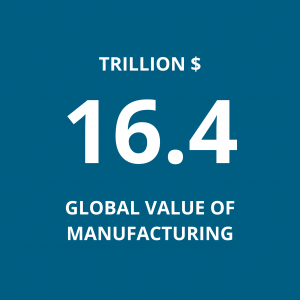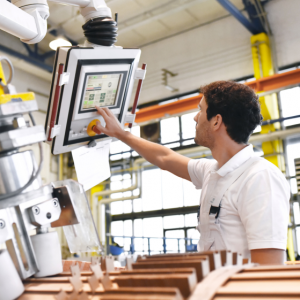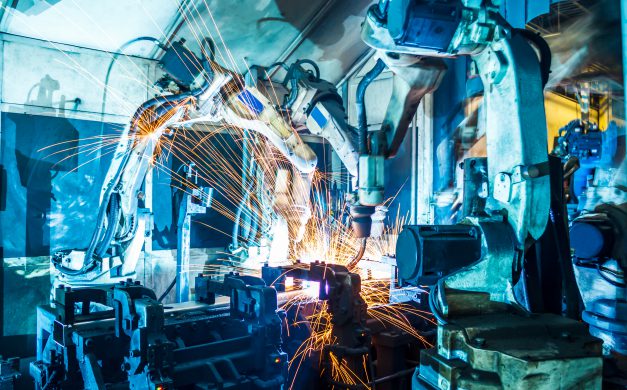Digital transformation as a strategy to overcome modern crises in manufacturing.
The global situation triggered by COVID-19, the conflict in Ukraine, rising inflation and raw material shortages is pushing the manufacturing industry to adopt new technologies.
In a recent survey, conducted in Brazil, China, Germany, Italy, Poland and the UK, we asked HR managers, plant managers and production managers about the challenges and opportunities of the 4th industrial revolution.
Key findings
| 66%
OF COMPANIES |
16.4 T$
|
84%
OF COMPANIES |
85%
BELIEVE THAT JOB PROFILES WILL CHANGE |
#1 LABOUR SHORTAGE
New roles and a move away from physical work

The lack of workers in the factory is one of the main challenges faced by manufacturing today: 66% of companies report difficulties in finding skilled workers.
Managers attribute this to fewer people wanting blue collar careers and a skills lag when adapting to new technologies.
Thirty-six per cent of respondents believe that the main cause is the traditional misconception about manual and low-skilled labour.
Looking to the future, workers will increasingly focus on fine-tuning machinery and monitoring production quality, and over the next three years companies will demand:
- Production operators
- Machine and device operators
- Quality Controllers
#2 DRIVING ECONOMIC GROWTH
Continued growth and optimism 
Representing 17% of the global gross domestic product, manufacturing is often described as the backbone of both social and economic development.
Despite global economic instability, the manufacturing industry continues to grow. Between 2020 and 2021, the total market value increased by 21 per cent to USD 16.4 trillion.
Optimistic about the development of the sector, experts highlight two priorities for the future: automation and sustainability.
#3 SMART FACTORY
The fourth industrial revolution is here
The results show that 84% of companies have already implemented some digital solutions. The most common are cloud computing, digital integration, big data analysis and cybersecurity.
Many decision-makers are accelerating digital transformation in response to labour shortages: 22% say they will definitely implement new digital technology in the next five years, while 63% are likely to do so.
The increase in demand is reflected in technology vendor projections, with the industrial automation market set to reach a value of USD 265 billion by 2025.
#4 NEW SKILLS AND ATTITUDES
Combat labour shortages and improve the skills of your workforce
Only 25% of our sample believe that automation and digitisation will result in a reduction in employment. However, 85% agree that roles will change.
In order to adapt, 76% of the experts see continuous learning as the key to ensuring lifelong employability and 42% prefer to train existing employees, using their practical experience and knowledge of the company.
87% of the companies contacted are already planning training on digital tools.
While all manufacturers compete for workers with a similar set of technical skills, soft skills such as flexibility, attention to detail and a desire to learn have become almost more valuable.
What to expect from production in the future?
> Read more in the full report






